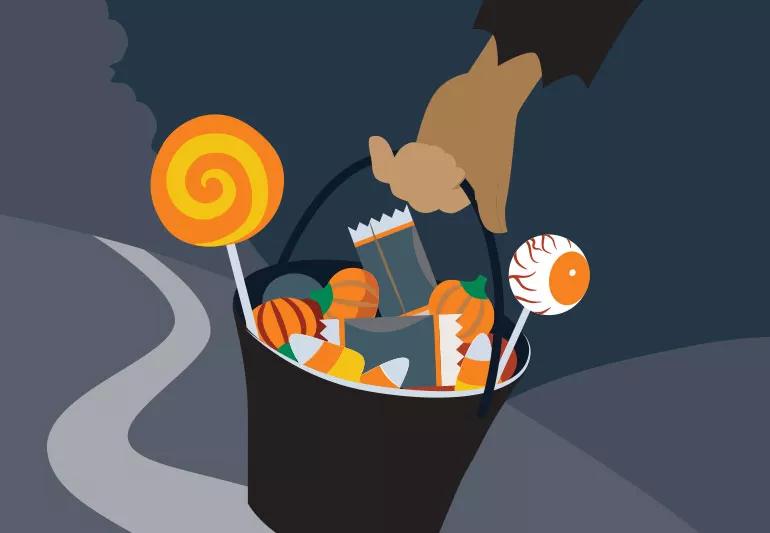Manage that sugar high with these tips

Image content: This image is available to view online.
View image online (https://assets.clevelandclinic.org/transform/48ccc5ed-cee3-4d75-b2b1-07eff954c8b0/halloweenCandyChild-858315206_770x533_jpg)
child with pail full of halloween candy at night
Your Frankenstein and Cruella have made their way around the neighborhood and come home with their bounty — a bag full of candy. Before you let your children dive into all those KitKats, M&Ms and Twizzlers, consider some helpful strategies to keep them from turning into sugar monsters.
Advertisement
Cleveland Clinic is a non-profit academic medical center. Advertising on our site helps support our mission. We do not endorse non-Cleveland Clinic products or services. Policy
Dietitian Nicole Hopsecger, RD, shares the pitfalls of eating too much Halloween candy, as well as some techniques for keeping the holiday fun and safe.
“Halloween is a holiday, and it’s OK for kids to consume candy,” she says. “It’s one day of the year. It’s the days following that tend to get us in trouble.”
We’ve all heard the damaging effects of eating too much sugar. But in children, it’s important to watch how much sugar they consume — not just on Halloween but every day. “A moderate amount of sugar can be part of a healthy diet,” says Hopsecger. It’s all about balance.
Too much sugar in children can lead to:
“Candy doesn’t have a lot of nutritional benefits,” says Hopsecger. “If kids fill up on candy all day long or sugary drinks, they’re going to miss out on the foods that can really support healthy growth for them.”
Eating or drinking added sugars should be kept to less than 10% of total calories, Hopsecger says. She recommends using the 5-2-1-0 rule for kids: Five or more fruits and vegetables per day; two hours or less screen time per day; one or more hours of activity per day; and zero sugar-sweetened beverages daily.
Advertisement
While there’s no magic number for how much Halloween candy you should let your child have, Hopsecger suggests thinking about your relationship with food to help guide you in making smart choices. She recommends the following:
Before you let your child dive into their candy pile, you need to sort through each piece checking it for a variety of things to ensure everything is safe.
We all know we should do this, but Hopsecger emphasizes how important this step is. “Any tampering with candy can’t be great for the child’s health,” she says. Start by inspecting that each piece is properly sealed and checking the expiration date. Throw away any that have torn wrappers or holes in the packaging.
Homemade treats are OK if it’s from a family or friend. But if you don’t know the person who made the treats, the best bet is to throw it away.
If your kid has a peanut, soy, milk or tree nuts allergy, be sure to check each piece of candy for ingredients that could cause an allergic reaction. “We don’t want a kid accidentally consuming something that would be dangerous for them,” Hopsecger says.
Another pro tip? To help limit the amount of candy your kid consumes, Hopsecger recommends having them pick out their favorite candy. “Really prioritize eating those types of candy, as opposed to the ones they don’t like so much as a way to help reduce intake,” she says.
Advertisement

Sign up for our Health Essentials emails for expert guidance on nutrition, fitness, sleep, skin care and more.
Learn more about our editorial process.
Advertisement
Most kids start losing baby teeth around age 6 — but there’s some wiggle room in the timeline
From playful movement to strength-building, kids need exercise to stay healthy and strong
Combat summer learning loss and keep young brains engaged with low-pressure learning
Heap on the praise for a job well done and stay consistent
Have their eyes evaluated shortly after birth, before their first birthday, and at ages 3, 5 and beyond
Routine screenings at school are normal and important
Teaching kids how to share at the appropriate age can help them develop social skills and manage their emotions
By disrupting a child’s ability to think and act for themselves, snowplow parents run the risk of delaying their child’s ability to learn
Prioritize your health by managing stress, strengthening your social connections and getting quality sleep
Bolsters, blankets, pillows and blocks can offer extra support, stability and comfort
Allergies, postnasal drip, asthma or reflux could be to blame for a cough that won’t quit